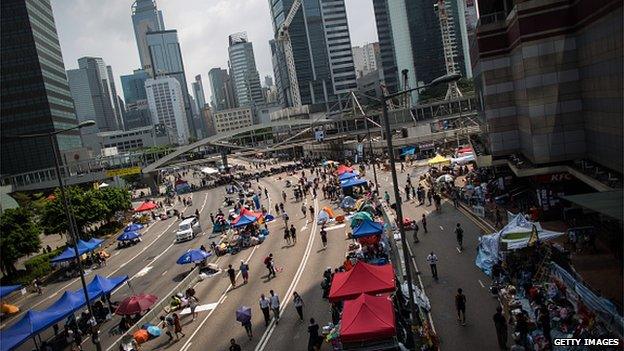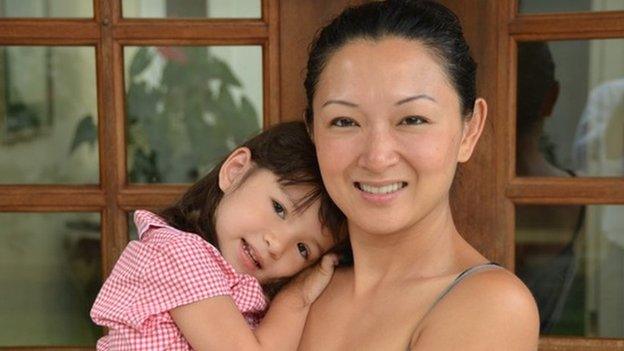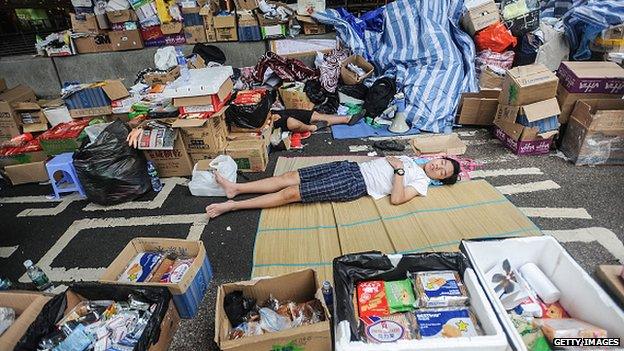Hong Kong voices against the protest
- Published

As pro-democracy activists continue to occupy parts of Hong Kong, residents opposed to the protests voice their concerns for the future of the territory.
The protesters are angry at China's plan to vet candidates for polls in 2017, saying they want full democracy.

Joanna Jones Tan, former lawyer and now full-time mother, says the protesters don't represent Hong Kong's "silent majority"
The majority in Hong Kong is suffering in silence and patiently waiting out the "disturbance", which isn't just a disturbance.
There was a heart-breaking report of a young woman who died in hospital without her family next to her as they couldn't get through the demonstration crowds.
C-sections were scheduled for women due to have babies this week in case they don't make it to the hospitals for a natural birth.

Joanna Jones Tan: "Why risk everything we have by pushing China into a corner?"
These events are impediments to life, not mere "disturbances".
You might argue that such impediments are justified if they might bring about significant change or where a nation is faced with deep crisis of some kind. But this isn't the case here.
Hong Kong is one of the safest and most desirable places to live in the world. It has world class public health care for everyone.
We have a lot to lose, and weighing against this, is the reality that these protests have no chance of bringing about any change. China will not agree on universal suffrage as it has the security of an entire country to consider.
The majority fears for the future of Hong Kong should the demonstrations go wrong.
Why risk everything we have by staging these demonstrations and push the Hong Kong and Chinese governments into a corner?
So yes, there is a majority waiting, with baited breath, for the demonstrations to pass peacefully and dissipate so that we can get on with our lives.

Paul Lang - retired and with a chronic illness - is concerned emergency vehicles can't move around freely due to the protests.
I agree with the cause of the protesters, but not with their actions. Most people around me feel the same way.

Protesters have been blocking the area around government buildings for days
They are right to ask for democracy and I myself believe Hong Kong should have universal suffrage. But this is not our most pressing concern. What worries me more is that the economy is in a bad state and the government is corrupt.
The media portrays the protesters as polite. I don't see it that way. They've been aggressive towards the police and there's been some use of bad language.
But most importantly - they are inconsiderate and show disregard for the safety of others - roads are blocked, schools are closed, emergency vehicles can't move around freely. There could be unnecessary loss of live because of this.

Benny Hui, 46-year old tutor, views the actions of protesters as "extremist"
Schools closed, roads blocked - these protests have made so many Hong Kong residents unhappy.
We are also worried about the future of Hong Kong.
We saw the massacre in Tiananmen Square and we don't want the same to happen here.
The police in Hong Kong won't be able to crack down on the protesters and so the fear is the PRC army may come in to do the job.
It will make things very difficult in Hong Kong and have implications for our future.

Nick Lam, 33-year old banker, thinks the protests further polarise the society
Being on the "against" side of this protest and working at Admiralty, at the epicentre of it, does bring a bit of unwanted stress. And although the crowd's behaviour has been good, there's always the fear of being confronted by angry individuals.
They broke into a government building and that's illegal. So the police came in, trying to do their jobs. Protesters saw that as oppressive action. I'm disgusted with how the protesters behaved.
They seem determined to get some form of democracy sorted and are very stubborn about it - democracy or end of the world and nothing else.
There's a growing unhappiness from working people, whose loss of incomes could further polarise the society.
I want it to end peacefully because whether protesters get what they want or not, there'll be minimum impact on the future of Hong Kong.
Interviews by Amber Dawson and Krassimira Twigg